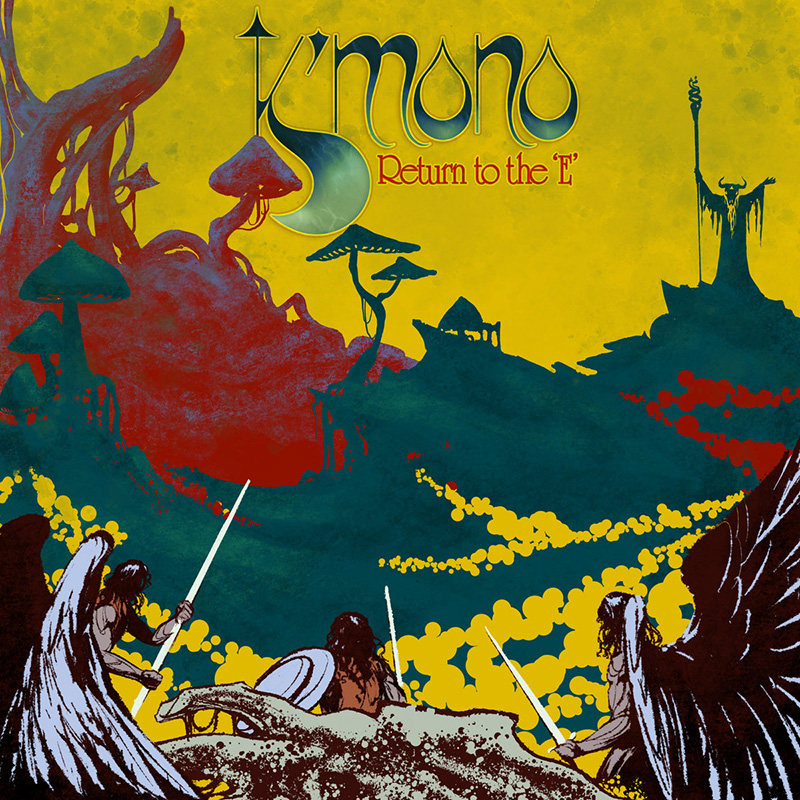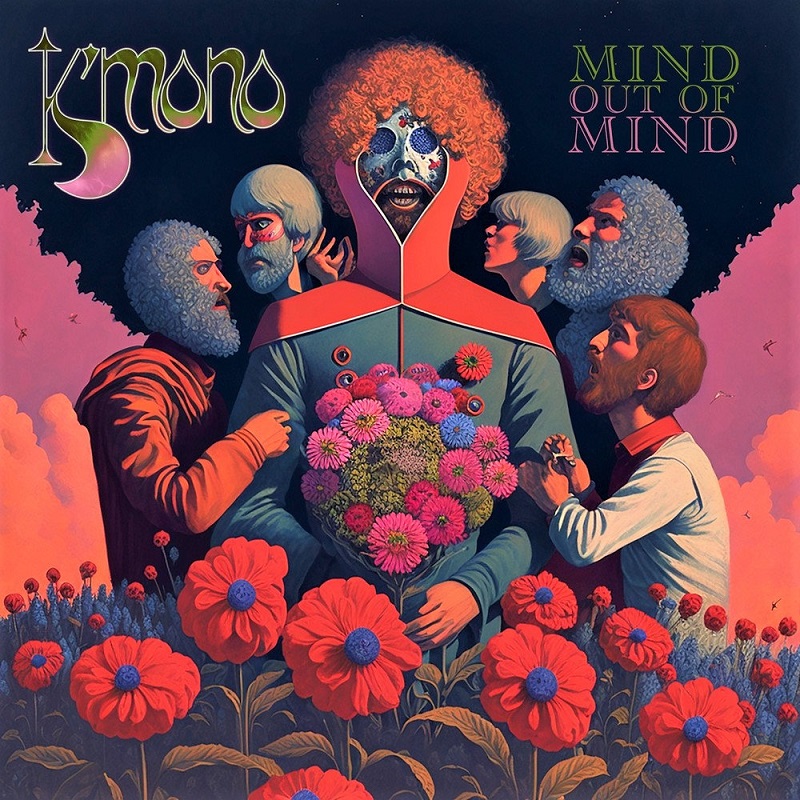Hailing from the vibrant music scene of Minneapolis, K’MONO, a Progressive rock trio, brings a breath of fresh air to the genre. Inspired by ’70s prog legends like Yes and Pink Floyd, they infuse a modern touch into their classic approach. With elements of space-rock, psychedelia, and funk, K’MONO’s sound is both lively and contemporary, creating a fusion that honors the past while embracing the present.
Can you tell us about the inspiration behind your album “Mind out of mind” and the fantasy concept that runs through it?
Jeffrey Carlson: I’m a storyteller at heart, although I am told by my wife that my stories drag on for too long. Personally, I am not a big lyric person, and am ashamed to say so. I am more into the emotion of how things are sung. To me, the melody speaks more than words. But, coming up with a plot is interesting and comes naturally. I came up with a fantasy story and sent the whole thing to Chad, and he did a wonderful job of adapting the tale to lyrics. A large majority of progressive rock albums are concept driven and I thought it was only natural that we should attempt going that direction, at least for one album. It also gives the album more cohesiveness. If one song sounds different from the other, at least lyrically and thematically you blend everything together with the concept.
Chad Fjerstad: To summarize, there is a king who is so unruly and so despicable that eventually his entire kingdom turns against him to banish him. They force him to ingest an ancient psychotropic plant, then force him out into the wild with nothing to his name. Upon his journey through the unknown, he must basically find a way to be reborn. To start from scratch.
How has your music been received in the United States, and what has the international reception been like in other countries around the world?
Jeffrey Carlson: I think we’ve caught more attention outside of the US. It’s amazing seeing reviews, comments and interviews we’ve done in all these different countries. Most of the reviews we’ve gotten have to be translated, which is such a blast to read and very exciting to us when we see them.
Chad Fjerstad: The response has been astonishing, globally. It’s very satisfying to see it reaching ears all over the planet. The U.S. isn’t even our strongest base for listeners – it’s always shifting – as of today we have our strongest listener counts in Santiago, Oslo, and Istanbul, for example. It’s interesting because we are living through an era where the music industry is primarily a numbers game. And without management or a P.R. representative, it can be very difficult to get anyone to check out your music as a new band at all. But with K’mono, the people whom we wanted to hear it seemed to find it on their own almost immediately, upon the release of our debut album in 2021. While we don’t have the highest play counts, what we do have is a large quantity of album reviews that are unanimously giving our music praise on a higher level than we ever imagined we’d see. That’s one of the greatest things you can hope for as a musician. We’re really just happy it found like-minded ears, from three prog lovers to all of our mutuals.

Could you share with us some of the most prominent musical influences that have shaped your sound as a band? Are there specific artists or bands that have had a significant impact on your music and creative direction?
Jeffrey Carlson: Outside of the typical progressive rock legends like Yes, King Crimson, Rush, Genesis, Pink Floyd and Camel, the biggest bands I draw inspiration from, whether its consciously or subconsciously, would be: Black Sabbath, 10cc, Ween, and Frank Zappa, but also draw from bands from my youth like Cursive, The Mars Volta, and Primus. I think it’s inevitable that there’s a little bit from all those bands somewhere within our music which is a pretty vast landscape and why I personally pride ourselves in being a prog band that doesn’t just sound like a carbon copy of one of the progressive rock classic bands.
Chad Fjerstad: King Crimson, Yes, and Camel are the bands we saw eye to eye on, who really inspired us the most from the ground up. But, we listen to a lot of music. And there’s so much incredible stuff out there. I try to listen to something I’ve never heard before every time I have a day off. Uriah Heep, Goblin, and Steely Dan are a few other big ones when it comes to my approach to songwriting in this band. Timothy and I used to tour together in a melodic death metal band, so another band that I think is very important in our trajectory together as musicians is Opeth – that band and their evolution from brutal heavy metal to pure prog has been inspiring us since we were in high school. Mikael Akerfeldt is one of the greatest musicians in the contemporary musical landscape.
What is K’mono’s perspective on the 70s sound, as evident in your last album ‘Mind out of mind’? It’s just 70s nostalgia and do you believe it’s still a unique hallmark of the 70s era, or do you think it has become more than a 70s prerogative and a sound that transcends decades, being part of contemporary music as well?
Jeffrey Carlson: The 1970’s are by far my favorite musical decade. The creativeness in even pop songs blows me away. The production in that era is just perfect too. To me, that era is just loaded with diversity in styles and sound. When making records, I initially wanted all of our stuff to sound as close to 70’s production as possible, but this is something that is too complex and hard to accomplish in the times we live in. Running things fully analog sounds fun on paper, but the knowledge and skill it takes to know how to do that is beyond our capabilities. So, we utilize as much vintage equipment and as many recording techniques as we can without overcomplicating things, and use modern technology as well. In turn, I believe we end up creating something new and fresh that cascades decades and becomes a thing of its own.
Chad Fjerstad: Most importantly, I think that a lot of the prog albums put out in the early 70’s are some of the finest music albums ever made, so naturally there is a desire to parallel several elements of those releases. But, there is also a rat race in modern music to make everything sound as big, heavy, and loud as possible, and that becomes very tired after some years. It’s refreshing to be making albums that are focused on being as balanced and listenable as possible, rather than trying to simply “big dick it” as so many modern productions attempt to.
In today’s digital age, social media plays a significant role in connecting artists with their audience. How has social media influenced your approach to promoting and sharing your music, and what platforms have been the most effective in reaching your fanbase?
Chad Fjerstad: We’re not much of a social media band thus far, but we’re very grateful for Bandcamp. Bandcamp is the best thing musicians have in this day and age, and is the primary reason we were able to start getting our stuff heard upon the release of our debut.

Your musical style often incorporates complex and profound elements. How do you see your role as artists in conveying philosophical messages through your music? Is there a particular philosophy or concept that you aim to explore or communicate through your songs?
Jeffrey Carlson: I think the common theme in Mind Out Of Mind explores self-evaluation; evaluating one’s ego and morals. These are themes I commonly end up writing about for some reason with all the music projects I’ve been involved in. If you’re not thinking about these types of things as a person, you’re in for some serious trouble. We all make mistakes constantly and owning up to those mistakes and attempting to make right on those actions is an important message to try to relay.
Chad Fjerstad: My songs on our first album were honestly just inspired by the bleak energy surrounding the global pandemic of 2020, and the desire to get through it. The second album is less personal for me – I simply took Jeff’s phenomenal concept and fleshed it out into a full narrative, though of course it’s still very abstract when you actually read through – I didn’t want it to be too straightforward, what fun would that be? Of course, there are many relatable themes to analyze within the full journey, but that’s left for each listener to make their own.
Many of your songs seem to carry a subtle reflection on social and political themes. How do you reconcile your artistic expression with commentary on current society and politics? Do you believe that music can influence political and social thinking?
Chad Fjerstad: Jeff & I seem to be similar in the sense that I am generally more of an emotional writer. I write about feelings rather than focused topics a majority of the time. I find this to be more universal. Feelings can be incorporated to whatever political or societal woes one is dealing with.
Jeffrey Carlson: I am not a political person and try to avoid news to a default where I should be paying more attention politically. Politics and morals/self evaluation go hand in hand so it’s easy to relay the message of that by writing the story written around politics. The abuse of power and greed in systems has been happening since the beginning of time and I do think some artists have accomplished some fight in these issues throughout time. Although I do not view us as a unit who are out to try to make any sort of political statement.
In your creative process, how do you incorporate your philosophical perspectives into the composition and arrangement of music? Is there a specific life philosophy that inspires your creativity?
Chad Fjerstad: The human experience is incredibly complex and, thus, so should the songs be to match that.
Progressive rock often embraces a wide range of musical and cultural influences. How do you view your role in building bridges between different cultures and philosophies through your music? Is there a particular culture or tradition that you find particularly inspiring?
Chad Fjerstad: My favorite thing about prog in comparison to nearly all other music genres, is that I feel you have the least rules or limitations within it. With prog, we want to be surprised as a listener. We want to be taken on a journey into the unexpected. This is potentially the most important thing about the genre. With K’mono, I feel that I can do literally anything I want as a songwriter. I can explore new worlds with my bandmates and all of our listeners are coming along for the ride, hopefully with big grins on all of our faces. On the subject of cultures, there is no one part of the world that inspires me in this project – it’s more so that I am inspired by all of it. I want to experience as much of the world as I can, so I can share all of that energy, and help take people to other worlds that don’t exist outside of my mind and the things I create, on top of that.
Have you noticed a particular reaction from your audience regarding the political or philosophical themes in your music? Do you believe that your music can contribute to social change or increased awareness of certain issues?
Chad Fjerstad: If we were ever put in a position of being more relevant faces in society’s spotlight, I would start to think more about what we can do to benefit the masses, but we’re not Rush or U2. For now, it’s just about the music.



